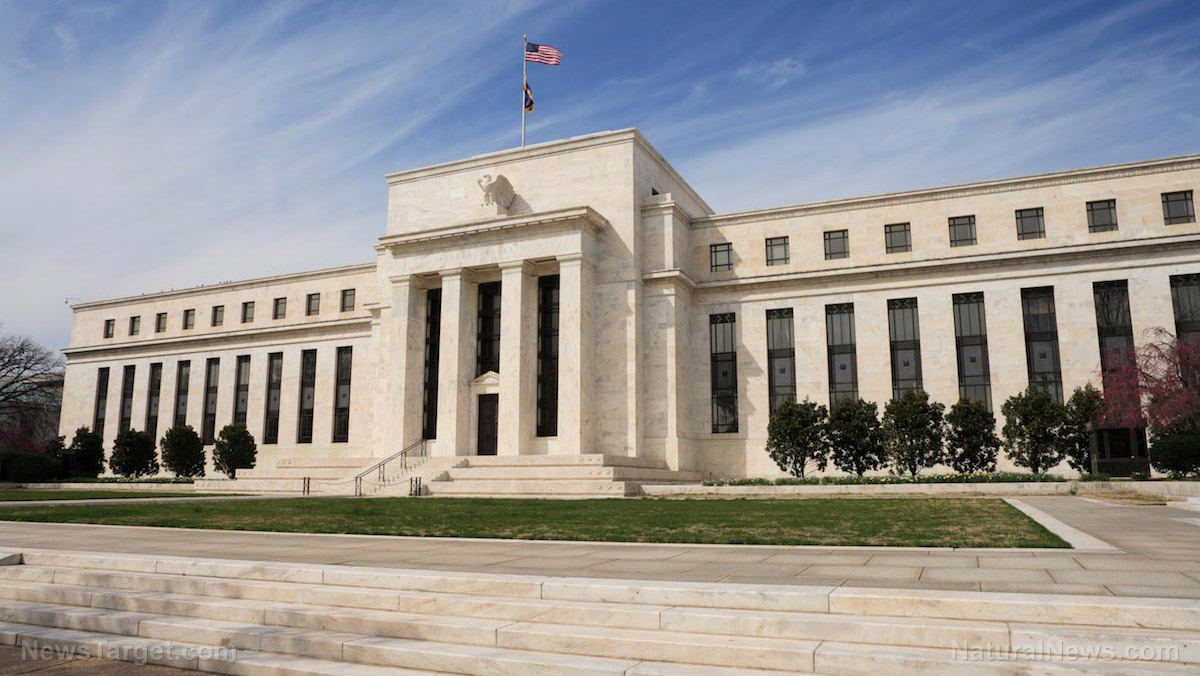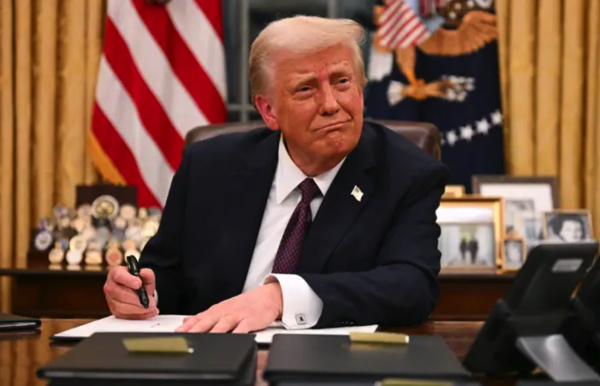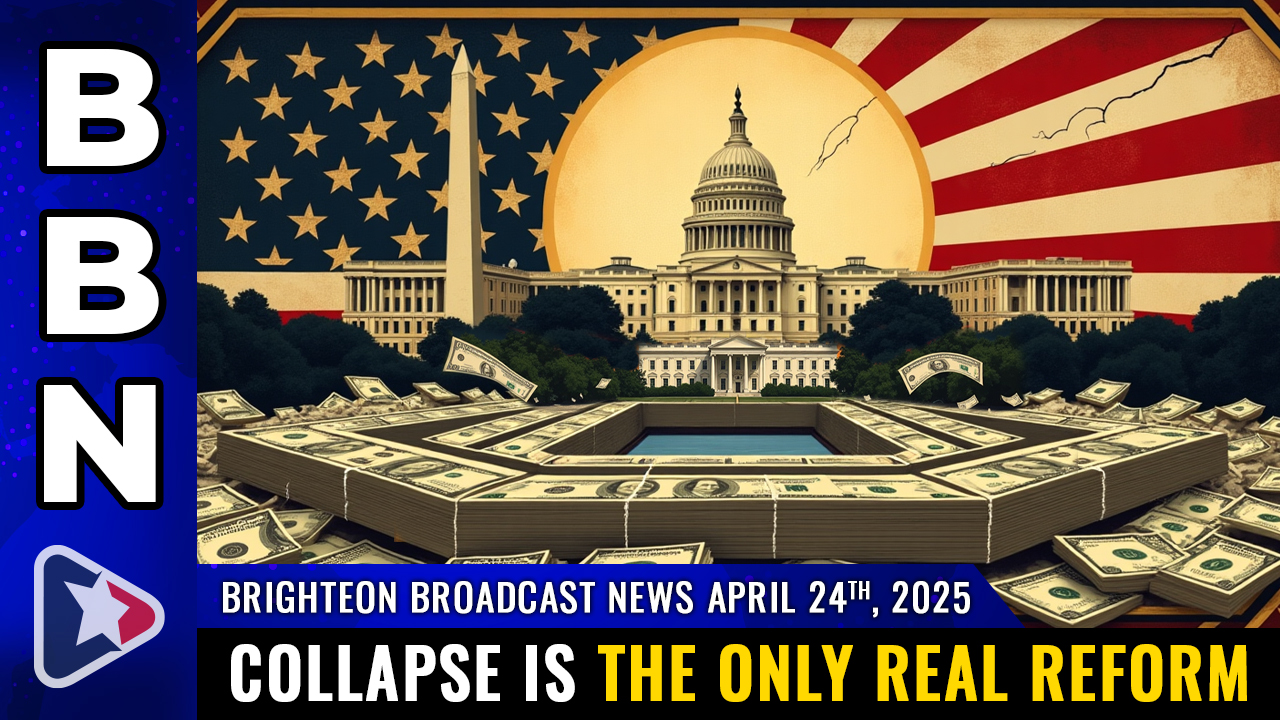Ex-Trump adviser Steve Bannon sounds alarm on unsustainable fiscal policies while global recession fears grow
04/25/2025 / By Willow Tohi

- Steve Bannon argues Trump’s economic strategy lacks mathematical viability, citing unsustainable debt, inflated growth projections and tariff wars that risk triggering a global recession by mid-2025.
- While Defense Secretary Hegseth slashed 800 million in wasteful spending (e.g., bloated HR software, DEI grants), Bannon calls it trivial compared to 950B in annual debt interest payments — now exceeding Pentagon spending.
- Trump’s aggressive tariffs (e.g., 104% on Chinese imports) spark retaliation, supply chain disruptions and recession fears. Economists warn of a 1929-style downturn; Canada’s March job losses (33,000) foreshadow broader economic pain.
- To counter unrest, Trump aides consider drastic measures like Universal Basic Income and middle-class tax refunds—funded by Fed money printing. Critics warn this risks hyperinflation, dollar collapse and gold price surges.
- The U.S. faces a fiscal precipice: tariff chaos, debt crises and potential social instability. Trump’s survival plan prioritizes short-term political gains (UBI, tax cuts) over long-term stability, leaving global markets braced for further turmoil.
As President Donald Trump touts aggressive cost-cutting at federal agencies like the Pentagon, former adviser Steve Bannon is sounding a dire warning: The administration’s economic strategy lacks the mathematical rigor needed to avoid a fiscal disaster. “The math doesn’t work,” Bannon emphasized, citing unsustainable debt loads, overpromising growth projections and a reliance on tariff wars that risk triggering a global recession by mid-2025.
Bannon’s alarm over debt and Pentagon waste
Bannon, a frequent critic of U.S. financial policies, argues that even Defense Secretary Pete Hegseth’s recent Pentagon cuts — a $580 million reduction in bloated HR software projects, diversity grants and consulting contracts — fail to address the core issue: $300 trillion in global debt holding systemic risks. The Pentagon’s announced cuts, part of a broader $800 million reduction since 2021, target items like a seven-year HR software project that ballooned to 780% over budget and DEI grants for “equitable” AI development. “I need lethal machine learning models, not equitable ones,” Hegseth remarked, highlighting the administration’s zero-tolerance stance on waste.
But Bannon insists $800 million in cuts are “a drop in the bucket” compared to the $950 billion spent in FY2024 alone just to service national debt interest — an amount exceeding Pentagon spending for the first time in history. “The bond market gets a vote,” Bannon stressed, noting that global creditors could soon demand repayment, derailing Trump’s tariff-driven trade wars with China and European allies.
Trade war escalation sparks recession fears
Bannon’s warnings align with economists predicting an economic “nuclear winter” fueled by Trump’s tariff juggernaut. U.S. border taxes—now at a crippling 104% on Chinese imports—are reciprocated, shuttering supply chains and boosting consumer prices. J.P. Morgan forecast a 60% chance of global recession by midyear, while Moody’s Analytics Chief Mark Zandi warned, “We’re entering one as we speak.” Canada, deeply integrated with U.S. markets, already faced March job losses of 33,000, with auto and manufacturing sectors bearing the brunt.
The 1929 Smoot-Hawley tariff precedent looms large. Like then, economists fear retaliation: “There’s no off-ramp unless the U.S. blinks,” said RSM Canada’s Tu Nguyen. Trump’s scheduled talks with Japan and Italy bring little hope, as tariff removals remain improbable.
Pentagon’s cloud gamble: JWCC next and the race against chaos
Amid the fiscal turmoil, the Pentagon bets on tech efficiency via JWCC Next, a follow-up to its $9 billion cloud contract. Due by 2027, the new deal seeks to incorporate smaller cloud providers, offering “the entire enchilada” of data ecosystems. Yet critics question priorities: Is this “mission critical” at a time when contractors like McKinsey were slashed for “non-essential” tech?
The Trump counterplay: UBI and tax refunds?
Behind closed doors, administration strategists quietly consider proposals to blunt recession pain. A potential banquet of taxpayer dollars could include a Universal Basic Income (UBI) — explored by Trump aides to pacify unemployed voters — paired with tax refunds targeting middle-class Americans. While Bannon dismisses such moves as “pipe dreams,” insiders suggest these measures could mitigate unrest fueled by Tesla protests and radical left recruitment. However, the cost—financed by the Fed’s “magic money machine”—risks hyperinflation and currency collapse, as gold prices skyrocket amid dollar devaluation fears.
Historical parallels to Weimar Germany or even 1970s stagflation loom, but Trump’s team frames UBI and tax cuts as necessary triage rather than policy failure. “People want to survive,” said one official, “and we’ll give them what they need to make it through.”
A nation at an economic crossroads
Bannon’s warnings underscore a grim reality: The United States stands at a fiscal precipice. Even as corners are rounded, Trump, Musk and those aligned with them that champion debt-funded UBI and targeted cuts, collapsing tariffs and global markets demand immediate resolution. With world leaders like Canada’s Prime Minister already scrambling to soften the blow, eyes turn to whether Trump will pivot or plunge the world deeper into crisis. The math may not add up, but for now, the administration’s survival playbook bets on politics outpacing economics.
Sources include:
Submit a correction >>
Tagged Under:
big government, Collapse, defense spending, dollar demise, dollardemise, economic riot, finance riot, Globalism, government debt, inflation, market crash, money supply, pensions, risk, supply chain warning, suppressed, Trump
This article may contain statements that reflect the opinion of the author
RECENT NEWS & ARTICLES
COPYRIGHT © 2018 MONEYSUPPLY.NEWS
All content posted on this site is protected under Free Speech. MoneySupply.news is not responsible for content written by contributing authors. The information on this site is provided for educational and entertainment purposes only. It is not intended as a substitute for professional advice of any kind. MoneySupply.news assumes no responsibility for the use or misuse of this material. All trademarks, registered trademarks and service marks mentioned on this site are the property of their respective owners.



















